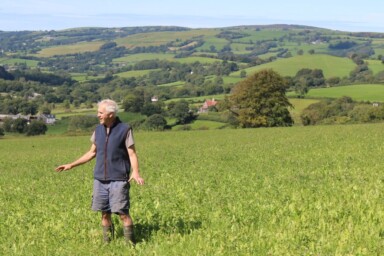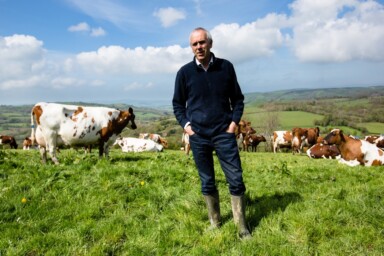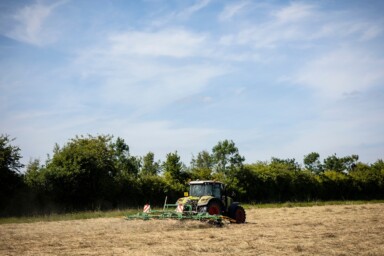Last Friday, Minette Batters, President of the National Farmers Union, had a meeting with our Prime Minister. Her key objective was to obtain assurances that the government would not sacrifice the interests of UK farmers on the altar of a post-Brexit trade deal, as a result of which they would have to face the cold wind of cheap food imports from farming systems operating to lower standards.
Will Boris make a binding commitment to prevent the import of food produced to lower standards? I’m not holding my breath.
Why would he not do that? I think the answer may lie with Dominic Cummings who is sitting in the back room at Number 10, poring over his black box and keeping his finger on the pulse of mainstream public opinion. My fear is that Cummings might well be counteracting Minette’s advocacy, arguing that even the combination of a million petition signatures plus Jamie Oliver’s campaign, is still not registering significantly enough as an electoral issue for the majority of the British public to justify a change of policy.
Should we feel despondent about this? Definitely not, because there is no doubt that Minette and Jamie’s campaign is tapping into a great and growing interest in the quality and provenance of our future food systems.
However, we should also recognise that if Cummings is briefing the Prime Minister that not enough people think this is a voting issue yet, he may actually be telling us the truth! Namely, that in order to force Number 10 to address the critical issues of climate change and biodiversity loss by improving the conditions for truly sustainable and regenerative farming, we have to inform and mobilise a much larger number of people. Because, in the end, Governments will always be largely ruled by the collective opinion of their citizens, who will either re-elect them or otherwise, and slavishly following Cummings’ dark arts algorithm box is probably the Prime Minister’s best hope of getting re-elected. It is also what persuades him to convert opinion into policy.
There is actually nothing new about all this. Let me give two examples, both of which relate to previous prime ministers. The first is from my Soil Association days. Lady Eve Balfour, the niece of Prime Minister Arthur James Balfour, was also the founder of the Soil Association. In establishing this organisation, she argued that its most important objective, was ‘to harness the power of informed public opinion’ to drive change in our food and farming systems. That was in 1946, and here we are, nearly 80 years later and we haven’t yet succeeded!
The other Prime Minister was Tony Blair. He also had the equivalent of Dominic Cummings at Number 10, a team of backroom data geeks, plus Alastair Campbell, who had his full attention, because he knew, as Boris now knows, that ‘Middle Britain’ is what gets prime ministers re-elected. So, right now, their correct conclusion may well be that the majority of the public still care more about the cheapness of food than they do about regenerative and sustainable agriculture. In other words, a million signatures is still a significant minority.
For this relatively uninformed majority, perhaps understandably, the apparent cheapness of food (even though as we know it isn’t really cheap at all) prevails over any emergent interest they might have in spending more on foods that are better for people and better for the planet.
The perhaps unpalatable truth is that, for all our campaigning efforts over the decades, as John Humphrys brutally reminded me in our recent podcast, we have still not succeeded in mobilising a sufficient volume of informed public opinion at the scale which is necessary to drive political change from the top down. This sounds a very negative conclusion, but actually we shouldn’t see it that way. What we have made progress in, is influencing public opinion which has shifted substantially in the last few years, inspired by events from the Paris Climate Agreement to David Attenborough’s recent Netflix film highlighting the existential threats now facing humanity. But when it comes to food, we still have some way to go in persuading mainstream public opinion that to address these threats, we must transform food and farming systems.
So it’s really very simple – all we need to do is to reach enough of the voting public to mobilise those in Number 10, and ultimately, the Prime Minister (who simply wants to get re-elected) and we will, as night follows day, instigate the policy changes that we have been advocating for so long.
Can we do this? Yes, we can! I mentioned David Attenborough who wrote me a charming note a couple of weeks ago in response to my request to interview him in a podcast, saying that he didn’t know enough to discuss these issues with me. Attenborough has long been a hero of mine, as he is of millions of people in the UK and globally, but he is also a focus group! In this connection, his relative ignorance about the impact of our food and farming systems, as he modestly admitted in his note, is mirrored by millions of other people throughout the world.
So this is our call to action. Our efforts to create an informed body of public opinion to date is only relative, as illustrated by Jamie Oliver and Minette Batters’ success in obtaining 1 million signatures to support higher standards of food imports. Make that 5 million (or maybe even 20 million!) and Government will listen!







